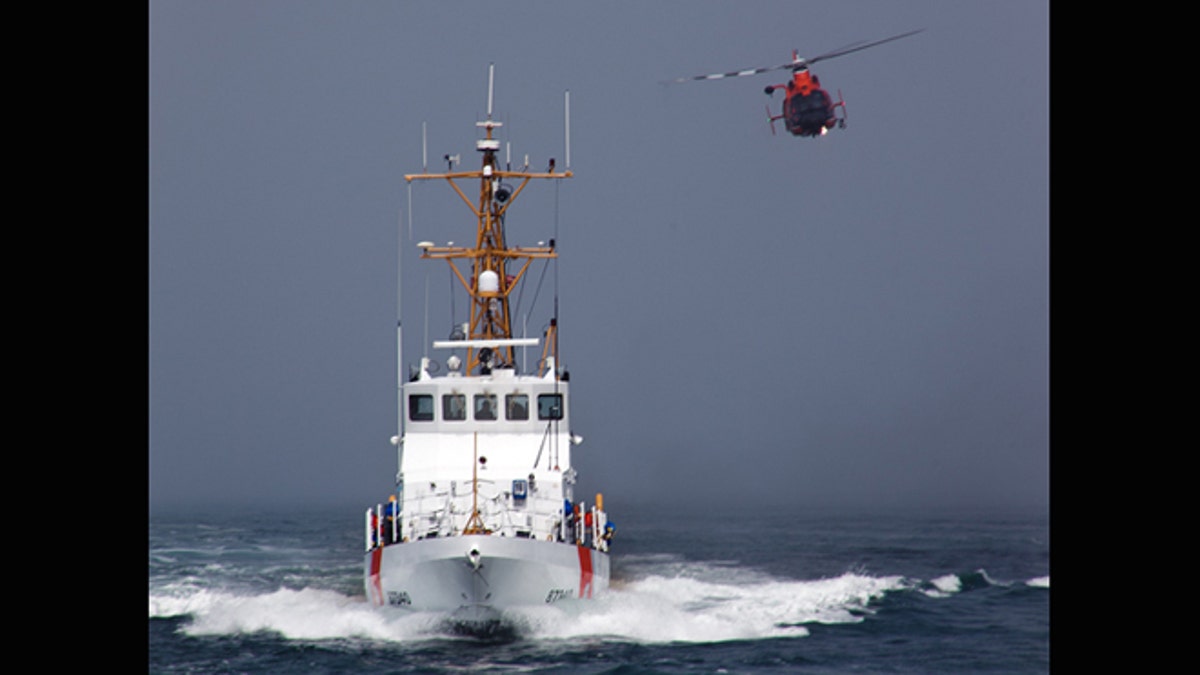
Aug. 29, 2011: CG-6501 (A HH-65 Rescue Helicopter from Airs Station Los Angeles) conducts a close fly-by of CGC HALIBUT as part of their joint efforts during a Koru-Care visit. Koru-care is a program that makes wishes happen for terminally ill children from New Zealand. (U.S. COAST GUARD/Steve Lee)
VENTURA, Calif. – The killing of a U.S. Coast Guardsman whose crew was chasing a vessel suspected of being laden with drugs appears to be the latest example of how smugglers are venturing farther north in a game of cat-and-mouse along the California coast.
Two Mexican nationals -- Jose Meija Leyva and Manuel Beltran Higuera -- were charged Monday in Los Angeles with killing a federal officer while the officer was on duty.
Chief Petty Officer Terrell Horne, 34, died Sunday after he was struck in the head by the suspect vessel near the Channel Islands, west of Los Angeles and about 180 miles northwest of the U.S.-Mexico border.
Horne is the first law enforcement official to die on California's seas since a spike in illegal activity began several years ago, said Ralph DeSio, a U.S. Customs and Border Protection spokesman.
At least six people aboard suspected smuggling vessels have been killed since the 2010 fiscal year.
The Halibut, an 87-foot patrol cutter based in Marina del Rey, was dispatched Sunday after the suspect vessel was spotted traveling without lights by a Coast Guard C-130 plane near Santa Cruz Island, the largest of the eight Channel Islands, the Coast Guard said. Authorities also sent a helicopter from San Diego.
The cutter contains a rigid-hull, inflatable boat that is about 16 to 18 feet long, said Coast Guard spokesman Adam Eggers. The smaller boat is routinely used on missions that require more speed and agility than the cutter can deliver.
As Horne and his team approached in the inflatable boat, the suspect vessel gunned its engine, knocking Horne and a second crew member into the water, Eggers said. The other crew member was treated for minor injuries and two others aboard the inflatable boat were unharmed.
Eggers said waiting for the vessel to make land would have introduced other risks and logistical challenges. The Coast Guard's mandate, he said, is to interdict at sea.
"As of right now, there are absolutely zero questions about whether they followed proper protocol," Eggers said.
U.S. authorities described the suspect vessel as a "panga," which are known in Mexico as old, single-engine wooden vessels typically about 25 feet long. Eggers declined to describe the suspect vessel or say if it contained any drugs.
In growing numbers, smugglers are turning to California seas to bring people and drugs to the United States from Mexico. The number of Border Patrol agents on land has doubled in the past eight years and hundreds of miles of fences and other barriers have been erected, driving smugglers to the Pacific Ocean.
U.S. authorities spotted 210 suspected smuggling vessels on California shores during the fiscal year that ended Sept. 30, up 15 percent from 183 incidents the previous year and more than quadruple the 45 incidents in 2008.
More than half the sightings are still in San Diego County, bordering Mexico, but boats are turning up as far north as San Luis Obispo County on California's central coast. According to U.S. Immigration and Customs Enforcement, there were 14 incidents in Los Angeles County last year, seven in Ventura County and 11 in Santa Barbara County.
Migrants pay thousands of dollars to launch from beaches and small fishing villages south of Tijuana, Mexico.
In one typical case in October, a Mexican woman told authorities she agreed to pay $12,000.
Sheriff deputies found 16 people -- all but one a suspected illegal immigrant from Mexico -- in a 31-foot vessel that appeared to be taking water in the Newport Beach harbor.
The Halibut's commanding officer, Lt. Stewart Sibert, said Monday he and his crew were devastated by the loss of Horne, calling him the best shipmate he ever knew.
"He was my friend, he was my confidante, he was the glue that held my crew together," Sibert said, choking back tears. "He gave me advice more times than I could count."
Just a few months ago, Horne helped save the lives of three people on a sailboat that was struggling against darkness and howling winds near the Channel Islands.
"Our fallen shipmate stood the watch on the front lines protecting our nation, and we are all indebted to him for his service and sacrifice," said Admiral Robert J. Papp, Coast Guard commandant.

